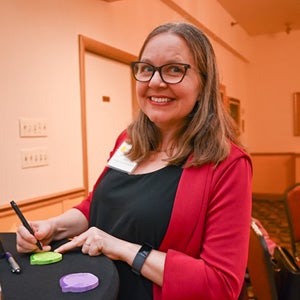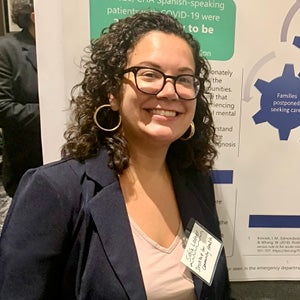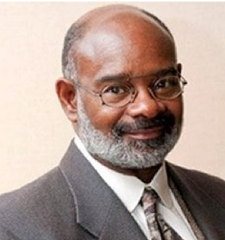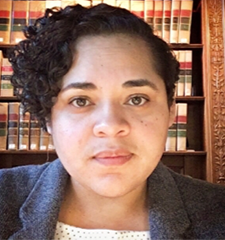For more information:
Email UsWe all are impacted by, and reap the benefits of, medical research discoveries. From over-the-counter drugs, to healthcare policies and educational interventions, many of these advancements are a result of incredible feats, decades of work, and sometimes serendipitous events. Join us as we sit down with Harvard researchers to discuss these captivating behind-the-scenes stories of research.
January 24, 2024
Genomics and Healthcare
What role can genomics play in improving healthcare? Jason Vassy, MD, MPH, MS, of Veterans Affairs (VA) Boston Healthcare System and Brigham and Women’s Hospital shares his research on how patient DNA might be used to improve healthcare and prevent disease.

Jason Vassy, MD, MPH, MS, is an associate professor of medicine at Harvard Medical School, a clinician-investigator at the Veterans Affairs (VA) Boston Healthcare System and Brigham and Women’s Hospital, and a founding member of Precision Population Health at Ariadne Labs. He is a practicing primary care internist and researcher whose work is focused on the implementation and evaluation of genomic medicine interventions. Vassy earned his MD degree from Washington University School of Medicine before completing an internal medicine residency at the University of Pennsylvania and a Harvard General Internal Medicine Research Fellowship at Massachusetts General Hospital.
December 13, 2023
The MIND Project: Neurodiversity and Inclusivity
“The more diverse that we are, the better off we are for the health, safety, and success of the human race,” says Kris King, founder and executive director of the Trans+ Community Celebration at Harvard University. In this episode, King discusses the importance of embracing neurodiversity to create a more compassionate and inclusive world. Isabel Castanho of The MIND Project serves as guest host.

Kris King (they/he) is a nonbinary, transmasc, autistic, multiply-disabled activist and student at Harvard College who is studying history of science and women and gender studies. King is a member of the Inclusion & Belonging Student Leadership Council, Student Accessibility Advisory Committee, and Council of Autistic Advisors for the Autism Society. He serves as policy chair of Harvard Athlete Ally and is on the U.S.A. Curling Divisional Board. King is passionate about intersectional and margin-to-center equity approaches to policy and reform, particularly for autistic and neurodivergent individuals, trans+ individuals, athletes, and broader disability communities. He was the lead facilitator of the 2022 and 2023 Harvard Trans+ Community event, the largest student-run trans event in history to their knowledge. King also served as executive director of the 2021 conference “Autism: Education & Equity – A Public Health Discussion” and is founder of a neurodivergency-focused nonprofit Pandemic Learning Tutors. He is former director of community engagement for the Trans Community of New England and former president of the nationally competitive Harvard Curling Team.

Isabel Castanho, PhD, is a neurobiologist and postdoctoral research fellow working with Winston Hide, PhD, at Beth Israel Deaconess Medical Center. Fascinated by the brain, particularly when it responds to threats and disease, she recently left the experimental laboratory to use bioinformatics and computational methods to continue studying the most complex organ of our bodies. Her research interests include investigating Alzheimer’s progression and identifying protective mechanisms for this devastating disease through the study of genes and their regulation, with the ultimate goal of contributing to the design of therapeutical strategies to treat Alzheimer’s disease effectively. In parallel to her research, Castanho is interested in mental health and illness, and neurodiversity. As a core member of The MIND Project at Harvard University, she oversees science communication and outreach efforts to advocate for mental health and neurodiversity. She is one of the co-founders of Neurodiversity at The MIND Project, which focuses on acceptance, inclusion, belonging, education, awareness, understanding, and celebration of the variations of the human mind.
November 15, 2023
Addressing Hypertension: Engaging Black Communities in Boston
“Without the input of the people in the community, I don’t think we would be essentially where we are,” says Ruth-Alma Turkson-Ocran, PhD. In this episode, Turkson-Ocran and Stephen Juraschek, PhD, of Beth Israel Deaconess Medical Center, discuss their research study entitled “Groceries for Black Residents of Boston to Stop Hypertension.” The conversation focuses on how they’ve engaged the local community in their research as well as their work with Harvard Catalyst’s Community Coalition for Equity in Research.
Ruth-Alma Turkson-Ocran, PhD, MPH, APRN, FNP-BC, CNE, is an instructor of medicine and a clinical investigator with the Division of General Medicine in the research section at Beth Israel Deaconess Medical Center and Harvard Medical School. She is also a board-certified nurse practitioner. Turkson-Ocran is committed to ethical research that empowers underserved and marginalized populations. Her research interests are centered around social determinants of health, cardiometabolic and kidney disease, and wearable devices, particularly among persons of African descent. She uses nationally representative datasets and community-engaged research to inform interventions reducing inequities in cardiometabolic disease.
Stephen Juraschek, MD, PhD, is a physician investigator at Beth Israel Deaconess Medical Center and an assistant professor at Harvard Medical School. He has published more than 100 papers (over half first-authored) from more than 15 distinct cohorts. In addition, he participated in the primary publication of seven distinct clinical trials focused on nutrition and lifestyle interventions to improve clinical outcomes. He is currently the principal investigator on several NIH grants and is an internationally recognized expert in blood pressure. Juraschek is passionate about the role a healthy diet plays in lowering blood pressure and preventing cardiovascular disease, which represents a major focus of his current work.
September 27, 2023
The MIND Project: What is Neurodiversity?
Neurodiversity is a concept that recognizes the natural diversity of neurological traits and conditions of human beings. Guests Georgios Ntolkeras, Walid Yassine, and Anuksha Wickramasinghe from The MIND Project at Harvard join us to explore this topic and their work in this area. Isabel Castanho of The MIND Project serves as guest host.
Isabel Castanho, PhD, is a neurobiologist and postdoctoral research fellow working with Winston Hide, PhD, at Beth Israel Deaconess Medical Center. Fascinated by the brain, particularly when it responds to threats and disease, she recently left the experimental laboratory to use bioinformatics and computational methods to continue studying the most complex organ of our bodies. Her research interests include investigating Alzheimer’s progression and identifying protective mechanisms for this devastating disease through the study of genes and their regulation, with the ultimate goal of contributing to the design of therapeutical strategies to treat Alzheimer’s disease effectively. In parallel to her research, Castanho is interested in mental health and illness, and neurodiversity. As a core member of The MIND Project at Harvard University, she oversees science communication and outreach efforts to advocate for mental health and neurodiversity. She is one of the co-founders of Neurodiversity at The MIND Project, which focuses on acceptance, inclusion, belonging, education, awareness, understanding, and celebration of the variations of the human mind.
Georgios Ntolkeras, MD, is a medical resident in the Child Neurology and Neurodevelopmental Disabilities program at Boston Children’s Hospital (BCH). He is also a researcher at the Fetal Neonatal Neuroimaging and Developmental Science Center at BCH. His research focuses on the development of new neurophysiological biomarkers in epilepsy using electro- and magneto- encephalography (EEG, MEG), as well as medical device development with novel EEG technologies and human model generation for numerical testing of medical devices. Additionally, he is a core member of The MIND Project at Harvard University, and of the Global Mental Health @Harvard initiative, which is dedicated to tackling the scientific and life challenges caused by different mental health and neurodevelopmental conditions and improving mental health for all. Ntolkeras completed his training in general pediatrics at Baystate Medical Center, University of Massachusetts.
Anuksha Wickramasinghe is a senior at Harvard College who is studying neuroscience on the mind/brain/behavior honors track. She is the author of the 2022 Harvard Crimson column “ADHDventures.” She is also the outreach coordinator for the Harvard Undergraduate Justice Club, a representative for the Harvard University Student Accessibility Advisory Group, and a member of the MIND Project.
Walid Yassine, DMSc, MMSc, is a research scientist at Beth Israel Deaconess Medical Center, research associate at McLean Hospital and Massachusetts General Hospital, and an instructor at Harvard Medical School. His research focuses on the psychosis spectrum. Yassine uses different approaches, such as imaging, behavioral assessment, and artificial intelligence, to better understand the brain and the deviation from what is considered “typical”. His goal is to assess risk factors, discover objective biomarkers, elucidate disorder spectrum and symptom overlap, and provide biomarker-based targeted therapeutic interventions.
August 16, 2023
What is the Role of Culture and Language in Promoting Health and Well-Being?
To fully support community-engaged research, it’s important to understand the role of language and culture in promoting well-being. For this episode, guests Carrie Fisher, PhD, and Sofia Ladner, MPH, join us from the Institute for Community Health.

Carolyn (Carrie) Fisher (She/her/hers), PhD, is a research and evaluation scientist at the Institute for Community Health (ICH). At ICH, she leads evaluation and applied research projects with a focus on health-related advocacy and policy, trauma and trauma-informed approaches to evaluation, qualitative methods, and equitable evaluation. She has lectured and led workshops and webinars on community engagement, trauma-informed approaches, and qualitative methods. Fisher earned her PhD in cultural anthropology from the Graduate Center of the City University of New York (CUNY). Her dissertation, “From Incentives to Ayudas,” was based on fieldwork in rural Nicaragua and described the history and dynamics of interactions between a community of impoverished, small-scale coffee farmers and the various development agencies that have worked in the area between 1979 and 2006.

Sofía Alejandra Ladner (She/her/ella), MPH, is a research and evaluation project manager at the Institute for Community Health (ICH). At ICH, she is involved in evaluation projects on healthcare disparities among minority groups, substance use disorder prevention and treatment, and community organizing impact in health policy. She also supports Dr. Jessica Santos and the Leah Zallman Center for Immigrant Health Research as the community and staff engagement manager. Prior to her work with ICH, Ladner was a fellow at the Health Policy Commission, where her research and work focused on patient protection policies and carrier claims processing for Massachusetts. She received a BS in international health from Georgetown University and completed her MPH with a focus on community health at Massachusetts College of Pharmacy and Health Sciences.
April 12, 2023
Community Engaged: Equity in Research – Part Two
How can researchers reflect the diversity of community voices in their work? Community Coalition for Equity in Research members, Rosa Alemán, BA, of the American Civil Liberties Union of Massachusetts, and Mark Kennedy, MBA, of the Boston Public Health Commission, discuss the importance of building relationships within communities.

Mark Kennedy, MBA, is a senior program manager in the Chronic Disease Prevention and Control Division at the Boston Public Health Commission. In this role, Kennedy is leading the creation and implementation of the cancer early detection plan for the City of Boston. He is also faculty for “Shared Decision-Making: Essential Skills for Prostate, Lung and Breast Cancer Screening,” an online continuing medical education course at the Massachusetts Medical Society, and teaches graduate and undergraduate courses at Regis College and Emerson College.
Additionally, he is the Boston Region Leader for the Massachusetts Comprehensive Cancer Coalition (MCCC) for the Massachusetts Department of Public Health and is co-chair for the Boston Medical Center Oncology Accelerator Advisory Council. Previously, Kennedy spent 13 years at Dana-Farber. He received his executive MBA from Northeastern University.

Rosa Alemán, BA, is a digital communications and content strategist at American Civil Liberties Union (ACLU) of Massachusetts. She helps engage upwards of 70,000 ACLUM community members across social media platforms, with timely, relevant, and valuable content designed to educate and inspire meaningful action.
In 2015, Alemán designed a higher learning project titled #MyDiyMFA: A three-year self-directed education experience consisting of a year of reading, a year of writing, and a year of making. The DIY MFA project aims to empower people to learn powerful communication technology skills that amplify voice and perspective while encouraging the exploration of pathways and practices for proactively confronting systemic oppression, white supremacy, colonialist ideologies and institutional racism across societal sectors.
March 29, 2023
Community Engaged: Equity in Research – Two-Part Series
Join members of our Community Coalition for Equity in Research for the first of two conversations on their work, which is to serve as a trusted communication channel between researchers and community stakeholders, providing input on research proposals, among other tasks. Guests: Rosa Alemán, BA, American Civil Liberties Union of Massachusetts, and Mark Kennedy, MBA, Boston Public Health Commission.

Mark Kennedy, MBA, is a senior program manager in the Chronic Disease Prevention and Control Division at the Boston Public Health Commission. In this role, Kennedy is leading the creation and implementation of the cancer early detection plan for the City of Boston. He is also faculty for “Shared Decision-Making: Essential Skills for Prostate, Lung and Breast Cancer Screening,” an online continuing medical education course at the Massachusetts Medical Society, and teaches graduate and undergraduate courses at Regis College and Emerson College.
Additionally, he is the Boston Region Leader for the Massachusetts Comprehensive Cancer Coalition (MCCC) for the Massachusetts Department of Public Health and is co-chair for the Boston Medical Center Oncology Accelerator Advisory Council. Previously, Kennedy spent 13 years at Dana-Farber. He received his executive MBA from Northeastern University.

Rosa Alemán, BA, is a digital communications and content strategist at American Civil Liberties Union (ACLU) of Massachusetts. She helps engage upwards of 70,000 ACLUM community members across social media platforms, with timely, relevant, and valuable content designed to educate and inspire meaningful action.
In 2015, Alemán designed a higher learning project titled #MyDiyMFA: A three-year self-directed education experience consisting of a year of reading, a year of writing, and a year of making. The DIY MFA project aims to empower people to learn powerful communication technology skills that amplify voice and perspective while encouraging the exploration of pathways and practices for proactively confronting systemic oppression, white supremacy, colonialist ideologies and institutional racism across societal sectors.
March 15, 2023
Investigating Body Image in Adolescents
Does our body image influence eating behaviors or parenting around food behaviors? Jhordan Wynne, MPH, Harvard T.H.Chan School of Public Health, discusses her research investigating body image in adolescents.

Jhordan Wynne, MPH, is currently a doctoral student in the Department of Nutrition at the Harvard T.H. Chan School of Public Health. Wynne’s research interests encompass early food environments, breastfeeding, and the onset of preventable chronic diseases. She is also interested in intergenerational approaches to chronic disease prevention. Her work focuses on Black and Afro-Latin populations in the Americas, and other under-researched minority populations. Wynne obtained her BA degrees in Spanish and global environment and health, as well as her MPH in health behavior & health education from the University of Michigan, where her research centered on psychosocial factors associated with decisions to breastfeed.

